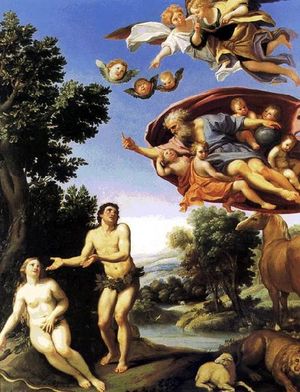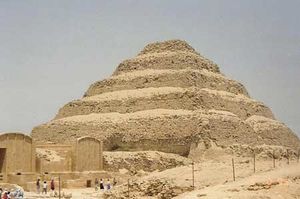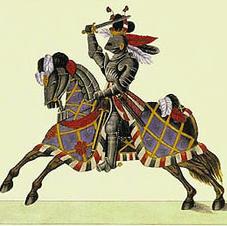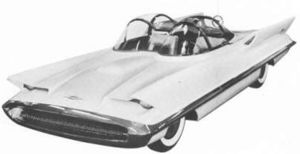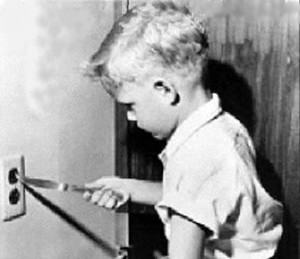Human history
“Anybody can make history. Only a great man can rewrite it.”
– Oscar Wilde on history
The ardent student of history soon becomes discouraged by the sheer volume of information and, quite frankly, crap that has to be waded through. The following short summary will tell you almost everything you really need to know about human history. And a lot of other stuff, too, including deliberate lies. Read carefully, and you will learn a lot.
Biblical times[edit | edit source]
The Bible is full of interesting caricatures. In the first book of the Bible, Genesis, Adam and Eve were created from scratch in an unlikely (and quite frankly, suspicious) sequence of events. Living a life of luxury in an upmarket resort, they had a dispute with the management about fruit consumption, and reptilian pets, and were asked to leave[citation needed]. One of their children, Cain, once asked, "Am I my brother's son?" – which may be the first example of a genuinely stupid question. Stuff happened. God ordered Abraham to sacrifice his son Isaac on Mount Montezuma, establishing a nasty precedent. Jacob, son of Isaac, stole his brother's birth mark, but still couldn't get laid. Jacob was a patriarch who brought up his twelve sons to also be patriarchs, but for some reason they did not take to it. One of Jacob's sons, Joseph, gave refuse to the Israelites. It was a confusing time.
The inhabitants of ancient Egypt were called mummies and mammals but never mammaries. They lived in the Sahara Dessert and travelled by Camelot. The climate of the Sahara is so unpleasant that the inhabitants have to live elsewhere, therefore certain areas of the dessert are cultivated by irritation. The Egyptians built the Pyramids in the shape of a huge triangular cube. The Pyramids are also a range of mountains between France and Spain. This is very confusing but fortunately irrelevant.[citation needed]
Pharaoh forced the Hebrew slaves to make bread without straw, the first significant step leading to the discovery of matzos. Moses led them to the Red Sea, where they made unleavened bread, which is bread made without any ingredients (real matzos). Afterwards, Moses went up to Mount Cyanide to get the Ten Commandments. Upon his descent he became confused and got stuck in the dessert for 40 years. Many consider this his crowning achievement[citation needed]. David was a Hebrew king skilled at playing the liar. He fought with the Philatelists, an aggressive and unpleasant race of people who lived in Biblical times. Solomon, one of David's sons, had 500 porcupines as wives.

Greco–Roman history[edit | edit source]
Without the Greeks, we wouldn't have history, democracy and many other modern conveniences, such as Architecture. The Greeks invented three kinds of colons: Corinthian, Doric and Ironic. They also invented myths[citation needed]. A myth is a female moth. One myth alleges that the mother of Achilles dipped him in the River Stynx until he became intolerable. Achilles starred in "The Illiad", by Homer. Homer also wrote "The Oddity", in which Penelope was the last hardship that Ulysses endured after a long journey. Actually, Homer was not written by Homer himself, but by another man of that name.
Socrates was a famous Greek teacher and philosopher who went around giving people advice. Not surprisingly, they killed him. Socrates died from an overdose of wedlock.
In the Olympic Games, Greeks ran races, jumped, hurled the biscuits and threw the java. They did not wear any clothes, and so we must surmise that the ancient Olympics were not televised in prime time. The reward to the victor was a coral wreath. The government of Athens was democratic because people took the law into their own hands. There were no wars in Greece, as the mountains were so high they couldn't climb over to see what their neighbours were doing. When they fought with the Persians, the Greeks were outnumbered because the Persians had more men. This statistical oddity has been beautifully illustrated in a number of modern moving pictures.
Eventually, the Ramons conquered the Greeks. (History dubbed these people "Romans" because they never stayed in one place for very long). At Roman banquets, the guests wore garlicks in their hair. Julius Caesar extinguished himself on the battlefields of Gall. The Ides of March murdered him because they thought he was going to be made king. Hero was a cruel tyranny who would torture his poor subjects by playing the fiddle to them. However the Romans were very smart. For example, Rome did not create a great empire by having meetings, they did it by killing all those who opposed them. This important lesson of history is mostly forgotten today.
Medieval times[edit | edit source]
Then, for some unknown reason, came the Middle Ages. King Alfred conquered the Dames, King Arthur lived in the Age of Shivery, King Harold mustarded his troops before the Battle of Hastings, Joan of Arc was canonized by Bernard Shaw, and victims of the Black Death grew boobs on their necks. Finally, Magna Carta provided that no free man should be hanged twice for the same offence, which was the last possible improvement to the modern justice system.
In midevil times most of the people were alliterate. The greatest writer of the time was Chaucer, who wrote many poems and verses and also wrote literature. Another tale is of William Tell who shot an arrow through an apple while standing on his son's head. This may be apochryphal, or just a justifiable distortion of the facts.

The Renaissance[edit | edit source]
The Renaissance was an age in which more individuals felt the value of their human being. Martin Luther was nailed to the church door at Wittenberg for selling papal indulgences on the internet. He died a horrible death, being excommunicated by a bull. It was the painter Donatello's interest in the female nude that made him the father of the Renaissance. It was an age of great inventions and discoveries. Gutenberg invented the Bible. Sir Francis Drake circumvented the world with a 100-foot nail clipper. Sir Walter Raleigh is revered to this day because he invented cigarettes. Another important invention was the circulation of blood which has become an indispensable part of our everyday lives.
The government of England was a limited mockery. Henry VIII found walking difficult because be had an abbess on his knee. Queen Elizabeth was known as the "Virgin Queen"[citation needed]. However, as a queen she was a success. When she exposed herself before her troops, they all shouted "Hurrah." Then her navy went out and defeated the Spanish Armadillo. Such is the power of suggestion.
The greatest writer of the Renaissance was William Shakespeare. Shakespeare never made much money and is famous only because of his plays. He wrote tragedies, comedies, and hysterectomies, all in Islamic pentameter. He lived at Windsor with his merry wives, writing tragedies, comedies and errors. In one of Shakespeare's famous plays, Hamlet rations out his situation by relieving himself into a long soliloquy. In another, Lady Macbeth tries to convince Macbeth to kill the King by attacking his manhood. Romeo and Juliet are an example of a heroic couplet. {{Shakespeare}} Writing at the same time as Shakespeare was Miguel Cervantes. He wrote Donkey Hote. The next great author was John Milton. Milton wrote
Paradise Lost. Then his wife died and, in a fit of depression, he wrote Paradise Regained. This turned out to be a mistake which was never corrected.
During the Renaissance, America began. Another mistake. Christopher Columbus was a great navigator who discovered America while cursing about the Atlantic looking for India. His ships were called the Nina, the Pinta and the Santa Fe. Later, the Pilgrims crossed the Ocean, and this was known as Pilgrim's Progress. When they landed at Plymouth Rock, they were greeted by the Indians, who came down the hill rolling their war hoops before them. Many of the Indian heroes were killed, along with their cabooses, which proved very fatal to them. The Indian squabs carried their porpoises on their back. The winter of 1620 was a hard one for the settlers. Many people died and many babies were born. Captain John Smith was allegedly responsible for all this.
Birth of America[edit | edit source]
One of the causes of the Revolutionary Wars was that the English put tacks in their tea. Also, the colonists would send their parcels through the post without stamps. During the War, the Redcoats and Paul Revere were throwing metal balls over stone walls. The dogs were barking and the peacocks crowing. It was an unbelievable racket. Finally, the colonists won the War and no longer had to pay for taxis[citation needed].
Delegates from the original thirteen states formed the Contented Congress. Thomas Jefferson, a virgin, and Benjamin Franklin were two singers of the Declaration of Independence, a popular group of musicians and entertainers. Franklin had gone to Boston carrying all his clothes in his pocket and a loaf of bread under each arm. He invented electricity by rubbing cats backwards and declared, "A horse divided against itself cannot stand."
Franklin died in 1790 and is still dead to this day, a remarkable feat.
George Washington married Martha Curtis and in due time became the Father of Our Country. Then the Constitution of the United States was adopted to secure domestic hostility. Under the Constitution the people enjoyed the right to bare their arms. With time, the Constitution was continuously incrementally improved so that today we can bare any part of our anatomy without fear of persecution.
Abraham Lincoln became America's greatest Precedent and had a car named after him.
Lincoln's mother died in infancy, and he was born in a log cabin which he built with his own bare hands[citation needed]as provided for in our Constitution. When Lincoln was President, he wore only a tall silk hat, thus extending our Constitutional rights. He said, "In onion there is strength". Abraham Lincoln wrote the Gettysburg Address while travelling from Washington to Gettysburg on the back of an envelope. He also freed the slaves by signing the Emasculation Proclamation, and the Fourteenth Amendment gave the ex-Negroes citizenship. However, back South of the Mason–Dixie line, the Clue Clux Clan would torch and lynch the ex-Negroes and other innocent victims. The Clue Clux Clan claimed that it represented law and odour. On the night of April 14, 1865, Lincoln went to the theatre and got shot in his seat by one of the actors in a moving picture show. The believed assasinator was John Wilkes Booth, a supposedly insane actor. This ruined Booth's career, not to mention Lincoln's trousers.
Europe decays[edit | edit source]
In Europe, the enlightenment was at a more reasonable pace. Voltaire invented electricity
and also wrote a pornographic novel called 'Candy'. Gravity was invented by Isaac Newton, which prevented people from flying off into space, thereby saving countless lives. Gravity is chiefly noticeable in the Fall when the apples (those pesky fruits again!) are falling off the trees.
Bach was the most famous composer in the world by far, and so was Handel. Handel was half German, half Italian and half English. As a result, he was very large. Bach died from 1750 to the present. Beethoven wrote very loud music because he was deaf. He took long waltzes in the forest even when everyone was calling for him. Beethoven expired in 1827 and later died as a result, an unfortunate and tragic series of events.
France was in a very serious state, as always. The French Revolution was accomplished before it happened. The Marseillaise was the theme song of the French Revolution, and it catapulted Napoleon into fame. During the Napoleonic Wars, the crowned heads of Europe were trembling in their shoes. Then the Spanish gorillas came down from the hills and nibbled at Napoleon's unprotected flank[citation needed]. As a result, Napoleon became ill with bladder problems and was very tense and unrestrained. He wanted an heir to inherit his power, but since Josephine (his porcupine) was a baroness she couldn't bear children.
The sun never set on the British Empire because the British Empire is in the East and the sun sets in the West. Queen Victoria was the longest queen. She sat on a thorn for 63 years. Her reclining year and finally the end of her life were exemplary of a great personality. Her death was the final event which logically and inevitably ended her reign.
The nineteenth century was a time of many great inventions and thoughts. The invention of the steamboat caused a network of rivers to spring up. People stopped producing by hand and started reproducing by machine. Cyrus McCormick invented the McCormick raper, which did the work of a hundred men. Samuel Morse invented a code of telepathy. Louis Pasteur discovered a cure for rabies. Charles Darwin was a naturalist who wrote the "Organ of the Species". Madman Curie discovered radium, with unknown but catastrophic results. And Karl Marx became one of the Marx brothers, as we all now know.
The end of innocence[edit | edit source]
The First Clusterfuck, caused by the assignation of the Arch-Duck by a surf ushered in a new error in the anals of human history, but more about that later.
See also[edit | edit source]
- History
- Timeline of World history
- Timeline of future World history
- The history of everything
- History of Woman
- Compleat history of the world
- History of packaging
- History of Rex Morgan, M.D. (1980–1989)
- History of cheat codes
- Theory of History
- AP U.S. History
- Feminism
- Fiction
- HerShey, Pennsylvania
- Historians
- Thucydides, alleged father of history
- Herodotus, yet another gay Greek historian
- Fake Historical Events
